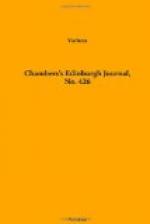We have already spoken of the deep interest we have taken in the progress of the infant schools. We visit them frequently, and attend all the examinations. On entering, it is scarcely possible to recognise in clean, orderly inmates, the dirty, ragged, quarrelling, scratching, screaming children of the back-streets, which, however, they were only a short time ago. All is changed: the miserable hut, the narrow street, and muddy lane, for a pretty room full of pleasant objects; the timid look and distrustful scowl, for sunny cheerfulness and open confidence. There is no unkind distinction among the lower classes in this country, and by this I mean the whole of the Austrian states. There being only two classes—the nobles and the commons—none of the commons despise each other, however poor or humble their situation may be. The barefooted orphan, kept and educated by charity or the state, is not an object of contempt or ridicule to the child of the prosperous artisan, who stands clothed in its little snow-white frock and pink ribbons beside its less fortunate companion. Neither is any distinction made on account of religion. The infant schools of the empire are for the children of all the poor—Catholic, Lutheran, evangelical, &c.; and the two belonging to Presburg, to which we here particularly allude, contain from sixty to seventy of the latter in every two hundred.
I was present at an examination of one of our Presburg seminaries in September last. A number of girls and boys, from three to five years of age, with a very few a little older, who had come in comparatively late, were subjected to the usual questioning in the various branches of their very elementary erudition. Some of the queries proved beyond the powers of the generality of the children; but this led to no expression of dejection or awkwardness. They evidently all endeavoured to do their very best. It was interesting to observe, that so far from pining to see a cleverer neighbour answer what they had failed in, they seemed to feel a triumph when, after a general difficulty, it was at length found that some one could give the right answer—shewing that they might have a feeling of emulation as to the honour of the school, but none as between one pupil and another. On several occasions, when some unusually intelligent little creature would come from a back-form, and solve a question which had bewildered those in front, there was a sensible expression of delight over the whole school.
In a far-off corner sat a little boy, poorly dressed, and of pallid countenance, but with a keen and intelligent eye, which had attracted my notice from the beginning. The more difficult the questions grew, his eye was fixed with the keener gaze on the face of the master. Several times I observed a puzzled child cast backwards to him a look, as expressing the assurance that he was able to solve all difficulties. At length, on a slight motion of the master’s hand, the




